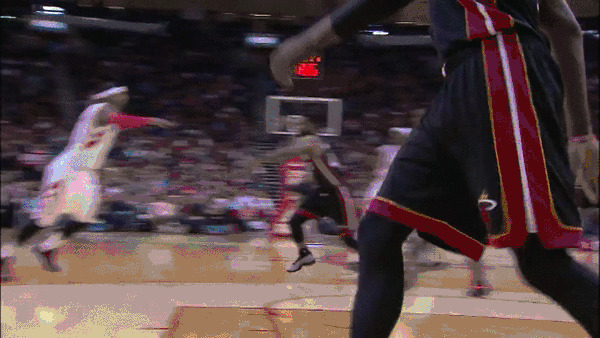The success of Josh Smith could be a blow to the analytical revolution Daryl Morey has cultivated as the chairperson for the annual MIT Sloan Sports Analytics Conference and as the Houston Rockets general manager.
For the first half of his tenure, Morey’s quantitative approach to roster management, which relied on data compilation that determines how a player projects to fit into a particular system, was considered an outlier.
Yet a shift in another direction has occurred in recent years. Some modicum of reliance on analytics has become the default front office model for half the smart teams in the league. However, a new school-old school battle has been waged – most famously in Memphis in 2013 between the front office and Lionel Hollins.
But like any rocket science equation, the formula’s taken some tweaking.
The Moneyball roster of compatible players has been combined with the star-driven system that’s been the impetus of championship teams for over a half-century. Yet analytics doesn’t explain the luck of the draw Houston has benefitted from in the past two years. While everyone else in the league has been looking at the dealer, Morey’s either counting casino cards or dialing a direct line to the basketball gods.
Since 2012, Dwight Howard, James Harden and now Smith have seemingly gravitated towards Morey’s franchise as if he was Isaac Newton under an apple tree. Smith is a square peg in a triangle hole with Houston, but if there’s anything we’ve learned in the past two years it’s to never doubt Morey.
There’s a striking story about Morey’s participation in a 20-team keeper fantasy basketball league with a then-startup Illinois-based sports information company known as Stats Inc. that serves as the origin of his auspicious player acquisitions.
Fantasy basketball more than any other sport besides football involves strategizing and long-term machinations. Naturally, in a move that foreshadowed his management axiom, a desperate Morey dealt his first round pick, Derrick Coleman, for the final pick in the draft. The year was 1994. A few weeks later, Michael Jeffrey Jordan, a 6-6 outfielder within the Chicago White Sox minor league system returned to the Chicago Bulls and rescued Morey’s fantasy hoops team in the process.
Murphy’s Law is an adage first attributed to an unnamed physicist in an Anne Roe book which states that “Anything that can go wrong, will go wrong.”
So let’s take this time to introduce the hypothesis of Morey’s law: Anything that can go right, even if it initially goes wrong, will inevitably bounce back in Daryl Morey’s direction.
The process has played out multiple times in the past two years. There have been moments when Morey’s genius has been scrutinized by a Hubble Space Telescope.
He traded Kyle Lowry to Toronto in order to squeeze Jeremy Lin into the fold and let Goran Dragic walk unimpeded to Phoenix that same summer.
He also was stuck in a tense season-long battle of wills with Omer Asik, who was upset about coming off the bench after Dwight Howard was signed and couldn’t start because he clogged the lane offensively.
This past summer was labeled an unmitigated disaster after the team lost small forward Chandler Parsons to Dallas while leveraging his restricted free agency against Chris Bosh waiting on LeBron’s free agency decision and emerged empty-handed. Asik was also traded to New Orleans for their 2015 lottery pick.
Two summers ago, I thought Morey had gone full John Nash on the league and lost his beautiful mind.
His Lin-sane in the membrane get c’hip quick plan involved Jeremy Lin, whom he’d waived a year earlier to make room for the Kyle Lowry, Goran Dragic, Jonny Flynn trio, and the future expiring contract of Dwight Howard pick n’ rolling their way to a title.
Morey’s grand plan hit a snag when the Lakers swooped in and orchestrated a three-team trade for Howard.
And then something strange happened.
James Harden’s price hit a nadir after his Finals invisible man trick, and Sam Presti finally came around to Morey’s swapping the reigning Sixth Man of the Year for Kevin Martin and a plethora of draft picks after Clay Bennett realized he didn’t want to get bitten by the luxury tax.
Then, Howard fizzled out with the Lakers and inked his name on Houston’s dotted line after they’d replicated his Orlando Magic supporting cast that reached the 2009 NBA Finals on the backs of shootings spreading the floor around Howard—plus Harden.
Smith is a low-risk high reward specialty at this point in his career and the Pistons paying him the remainder of his contract makes him the epitome of a Moneyball pickup.
He’s a rental on par with Billy Beane’s Jon Lester acquisition. Smith’s also the worst three-point shooter in league history, which is why a move back to power forward is expected to mitigate his inefficiencies. Of all players with a minimum of 1,000 attempts in their NBA career, Josh Smith’s 27.7 percent shooting is second-worst ahead of Charles Barkley’s 27.8 percentage from downtown.
Smith’s play on the perimeter contributed to the Pistons being outscored by 192 points this season when he was on the court while outscoring foes by four with him off of it. The 8-23 Pistons current three-game winning streak featuring wins over Indiana, Cleveland and Orlando contributes to the idea that the moody Smith may just be cancerous lead in the water filtration system.
The style in which Smith is deployed by Kevin McHale is in stark contrast to the injured starter Terrance Jones and Donatas Motiejunas, who are unmistakable stretch-4’s. Smith has to cut the high calorie mid-range shots out of his diet.
The Rockets shoot the league’s fewest mid-range J’s because they trade in those long 2’s for the most three-pointers in the league, which obviously Smith won’t be participating in as he’s gotten more inaccurate as his frequency of three-pointers has risen in recent years. On the plus side, he’ll be an upgrade defensively over Motiejunas, who struggled against versatile fours on a nightly basis..
They may not be as entertaining as Josh Gad and Kevin Hart, but the presence of his Best Man and former teammate on one of the great AAU squads of all-time—Dwight Howard, gives him a comfort ability factor he didn’t have in Detroit (or Atlanta), where he clashed with coaches and get that permanent mean mug expression removed from his face.
Smith’s first game as a Rocket was a rousing success, but the two games since have been a mixed bag. Smith’s 25 points in his debut, a Rockets win over Memphis, seemed to signal a rebirth of the Hawks incarnation of J-Smoove that Detroit paid for. However, his 3-for-13 shooting in losses to San Antonio and Washington have been a regression to the mean for the player Smith was in Detroit.
Smith hasn’t hit a single shot outside the paint, which was the area he was among the worst in last season.
McHale and his staff have already performed a miracle that the late U.S. Hockey coach Herb Brooks would be in awe of by transforming Harden and the Rockets as a whole into a formidable defensive unit.
It’s time for McHale and Olajuwon push Josh Smith into their world-renowned post scoring reform school and fix Smith’s intrigue with the mid-range game. Michael Malone’s staff did yeoman’s work with Rudy Gay’s volume shooting in Sac-Town and Lionel Hollins got the most out of Zach Randolph, therefore it’s reasonable to assume that Smith could be mended.
Things look bleak, but the jury is still out on Smith’s offensive and defensive contributions. The analytics tell us that Smith and Howard’s reunion probably won’t parallel Houston’s Olajuwon and Drexler. However, Morey’s Law reminds us that if anyone can make it work, it’s the Rockets.



